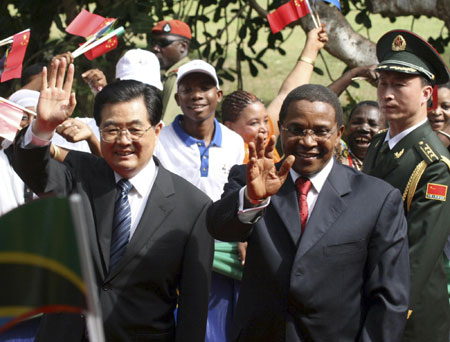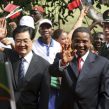
Beijing Launches Diplomatic Blitz to Steal Obama’s Thunder
Publication: China Brief Volume: 9 Issue: 4

Beijing has unleashed an unprecedented diplomatic blitz while the new Obama administration battles doubts about its stimulus packages to salvage the struggling American economy. For the first time, both Chinese State President Hu Jintao and Vice-President Xi Jinping were on trips abroad earlier this month—the former to Saudi Arabia and Africa, and the latter to Latin America. It was also the first time that two Politburo members, Xi and Vice-Premier Hui Liangyu, were simultaneously wooing countries in the U.S. backyard. While Xi’s road show included Venezuela, China’s ideological ally, and major trading partners Brazil and Mexico, Hui’s itinerary included Argentina and Ecuador (Agence-France Presse [AFP], February 15; Chinaview.cn, February 9).
Chinese diplomats and scholars have not given the United States a single mention while briefing the media on the diplomatic juggernaut that seems geared toward consolidating the country’s quasi-superpower status. Yet it is apparent that the trips, which followed hot upon Premier Wen Jiabao’s high-profile visit to Europe, were timed to take advantage of the geopolitical vacuum created by a United States that is bogged down by massive domestic woes. According to foreign affairs expert Chen Xiangyang, the multi-pronged foreign policy initiative would enable China to “seize the high vantage point [in handling] the future world order.” Chen, a scholar at the China Institute of Contemporary International Relations, added that Beijing wanted to “show its hand early” in the chessboard of international relations. “We want to send out China’s voice, maintain China’s image, and extend China’s interests,” he said (Outlook Weekly [Beijing], February 9).
Take President Hu’s tour of Mali, Senegal, Tanzania and Mauritius, for example. Some foreign analysts are puzzled by the fact that all four are neither big, powerful countries nor heavyweight producers of oil and other important minerals. Yet according to the Chinese Foreign Ministry, the main point of the presidential tour was precisely to demonstrate China’s embrace of big and small states alike. As Assistant Foreign Minister Zhai Jun noted, China’s interest in Africa was not “confined to energy and resources.” In an effort to reassure beneficiaries of Chinese aid that the economic doldrums would not affect the country’s foreign aid program, Zhai added that “China will honor its commitment to support the development of African countries and continue to encourage Chinese companies to further invest in and establish businesses in Africa.” Added the official People’s Daily, “Sino-African relations are not, as some have misrepresented, just energy and resource relations—that is, ‘neo-colonialism’ by China in Africa” (Xinhua News Agency, February 9; People’s Daily, February 13).
While in Mali, Hu laid the first brick of the Sino-Malian Friendship Bridge, which the Chinese head of state called “the largest project carried out in West Africa paid for with money donated by China.” Malian government figures put the cost of the 2.6 kilometers bridge at $74.9 million. Hu told Tanzanian President Jakaya Mrisho Kikwete that “China will fulfill its pledges and never decrease its aid to Africa.” The Chinese supremo added in a speech to Tanzanian dignitaries that China and Africa would “join hands in meeting the challenge of the global financial crisis [in a spirit] of unity and mutual aid.” The Middle Kingdom’s ties with Africa, of course, are far from being a one-way street. Apart from importing oil and minerals, China has boosted exports to Africa and Chinese manufacturers have set up plants in a dozen-odd countries. Bilateral trade multiplied tenfold from 2000 to last year to reach $107 billion, which was 45 percent up from 2007. Given falling commodity prices in the wake of the financial crisis, Beijing, which holds close to $2 trillion of foreign-exchange reserves, is on a buying spree for strategic resources in the minerals-rich continent. President Hu’s demonstrations of Chinese largesse will serve to placate anti-China feelings among African communities, which are complaining about “exploitation” by the fast-growing number of Chinese owners of mines and factories (China News Service, February 15; Reuters, February 13; Xinhua News Agency, February 16; Stratfor.com, February 11).
Of even more interest to Washington, which is sending Secretary of State Hillary Clinton to China later this week, are the Latin American trips made by Vice-President Xi and Vice-Premier Hui. Xi, who is expected to succeed Hu as Chinese Communist Party (CCP) General Secretary in late 2012, engaged in what some analysts call American bashing on his stop in Mexico. While meeting representatives of the Chinese community in Mexico City, Xi used extraordinarily strong language to decry unnamed foreigners for harping on China’s shortcomings. “Some foreigners have nothing better to do after filling their stomachs,” Xi said. “They keep picking on things Chinese. Yet China does not export revolution; it does not export hunger and poverty; and it won’t make trouble for others.” Xi’s fusillade was considerably more acerbic than the indirect volley that Premier Wen fired at Washington last month. Speaking at the World Economic Forum in Davos, Switzerland, Wen said that “inappropriate macro-economic policies in some economies” were behind the global financial meltdown. It is significant that Xi’s angry remarks were not carried by China’s official news agencies. And footage of Xi’s colorful talk—which had been available on some non-official Chinese websites for a couple days last week—were removed quickly by China’s ubiquitous Net censors (Straits Times, February 14; Wen Wei Po [Hong Kong], February 13; South China Morning Post, February 14).
Earlier during his visit to Mexico, Xi told his hosts that “China would stick to the path of peaceful development and a reciprocal and win-win open strategy.” The vice-president, whose main portfolio consists of party affairs, reiterated while visiting Columbia, Brazil and Venezuela that his country was committed to enhancing global trade on a mutually beneficial basis. This seemed to be an effort to reassure China’s trading partners, who are nervous about the apparent rise of protectionist sentiments in the United States, that the emerging quasi-superpower would not be closing its door to imports from their countries. Hu, Xi and Hui have also sought the support of African and Latin American countries for Beijing’s cherished goal of establishing a “new global financial architecture,” which is shorthand for an economic world order that is not shorn of domination by the U.S.-lead Western Alliances (Xinhua News Agency, February 13; Apple Daily [Hong Kong], February 16).
The extent to which Beijing will benefit from the goodwill garnered by the marathon trips will be evident during the Group of 20 (G-20) meeting, which is scheduled in London for early April. Beijing is gunning for a bigger say in international financial governance at this key multilateral summit. An internal position paper drafted by the Foreign Ministry said Beijing would demand higher voting powers for developing countries in the World Bank and the International Monetary Fund (IMF) at the London conclave. And in a thinly veiled dig at the United States, the paper said Beijing would also urge the IMF to “strengthen oversight over macroeconomic policies of all parties, particularly the major reserve currency economies, and provide oversight information and improvement recommendations to its members on a regular basis” (Financial Post [Canada], February 10; Reuters, February 9).
Beijing’s foreign-policy offensive has taken place while Team Obama is gingerly staking out its position regarding both China and the developing world. The CCP’s policy-setting Leading Group on Foreign Affairs, which is headed by President Hu, evidently wants to occupy the diplomatic high ground with the advent of Secretary of State Clinton’s first trip to China. Prior to Vice-President Xi’s outburst, the Chinese leadership had sent not-so-subtle messages to the Obama White House that Beijing might be playing tough in future exchanges. For example, the Chinese Foreign Ministry and official media last month blasted Treasury Secretary Timothy Geithner’s remarks about alleged “currency manipulation” by the Chinese government. Beijing has also laid into the “buy America” clause in the $787 billion stimulus package just passed by the U.S. Congress. A Xinhua commentary last weekend said: “Protectionism is no way out for a financial crisis. In fact, it could be a poison that will exacerbate global economic plight.” At the very least, however, the U.S. government has toned down its criticism of China’s trading practices. While participating in the Group of Seven (G-7) meeting in Rome earlier this month, Geithner changed his tune by noting that Washington “very much welcome the steps China has taken to strengthen domestic demand and its commitment to further exchange rate reform” (Bloomberg, February 14; Xinhua News Agency, February 14).
As of now, the CCP leadership has adopted a “wait and see” attitude with respect to the Obama administration’s initiatives toward China. The official media has highlighted conciliatory remarks made by Secretary Clinton on the eve of her maiden Asian tour. For instance, Xinhua and other media outlets have played up her statement that the United States did not regard China as an adversary, and that “when you are in a common boat, you need to cross the river peacefully together.” Clinton’s use of the Chinese proverb on the importance of reciprocity seemed to echo remarks about “global harmony” frequently made by Premier Wen and other Chinese leaders. Clinton also announced that mid-level military-to-military relations with China would soon be restored (Xinhua News Agency, February 14; New York Times, February 13). Irrespective of the outcome of the Clinton visit, however, Beijing has already demonstrated through its diplomatic blitz in Europe, Asia, Africa and Latin America that its voice must be heeded in the new world order where China’s position has advanced at America’s expense.





